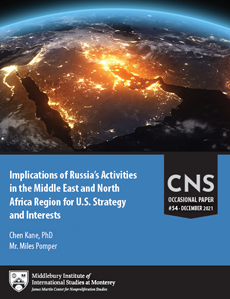December 19, 2021
Chen Kane, PhD and Mr. Miles Pomper
Russia’s ability to project power into the region remains limited today, and the status quo seems tolerable. But there are risks to U.S. interests in the future. The United States’ military withdrawals from Afghanistan, the Gulf and Iraq have significantly affected both U.S. regional posture and perceptions of U.S. commitment. Against that backdrop, the United States confronts multiple challenges as it seeks to “do more with less” in the region.
Russia’s opportunities in the region increase as U.S. involvement decreases. Moscow’s “low investment, high disruption” approach works because it leverages the self-interest of actors, stakeholders, and governments in pursuit of limited aims. The U.S. approach of “high investment, low disruption” to preserve favorable regional balances of power is more costly and affords the United States less latitude, since it is rooted in principles and values. Russia is well-positioned (along with China) to undermine U.S. interests incrementally. That is true in MENA itself and, given the impact of Russia’s activities in this region for U.S. strategic advantages, in other regions of importance to the U.S., such as Europe and Asia.
Countering Moscow’s efforts now should, therefore, be an important element of a revised and more comprehensive, yet also tailored, U.S. approach to the MENA region. What is needed is an adapted approach that leverages the United States’ comparative advantages to mitigate Moscow’s influence and that includes shifting some of the current U.S. presence to a more agile and unpredictable posture.
Throughout the report, regional countries are categorized into four groups reflecting their anticipated vulnerability to Russian influence-building: (1) “Russia’s friends” (Iran and Syria); (2) “Balancers critical to NATO’s power projection” (Libya and Turkey); (3) “U.S. friends requiring sustained attention” (Egypt and Iraq); and (4) “U.S. allies seeking limited engagement with Russia” (the GCC and Israel). The U.S. should tailor its efforts to: contain Russia’s influence in Iran and Syria, roll back Russia’s influence in Libya and Turkey, manage Russia’s influence — especially on the military and defense sectors —in Egypt and Iraq, and offer reassurance to the GCC and Israel in order to minimize Russian influence in those countries.

